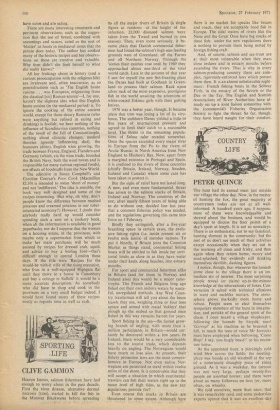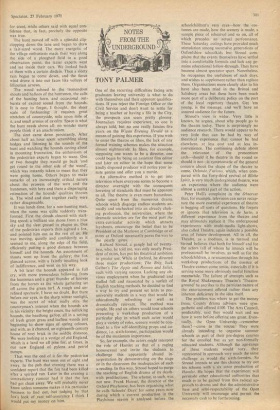PETER QUINCE
The hunt had its annual meet just outside our village the other day. Now, in the matter of hunting the fox, the great majority of countrymen today are not at all well- informed. A hundred years ago, I suppose, most of them were knowledgeable and shrewd about the business, and would be equipped to discuss the finer points of a day's sport at length. It is not so nowadays. There is an enthusiastic, not to say fanatical, hunting element in the community; but the rest of us don't see much of their activities except occasionally when they set out in the morning all clean and frisky, and then again when they return home, weary and mud-splashed, but evidently still thinking themselves devilish, dashing figures.
I notice, though, that whenever the hounds come close to the village there is an im- mediate stir of interest. The most surprising people reveal (or claim) up-to-the-minute knowledge of the whereabouts of foxes. Con- versation is salted with technical allusions to scent and suchlike matters. The atmo- sphere grows markedly more horsy and robust. People seem to elect themselves temporary members of the hunt in imagina- tion, and partake of the general spirit of the chase. I once heard a village shopkeeper, following the hounds by bicycle, snarl 'Gerrup!' at his machine as he breasted a hill, in much the tone of voice Mr Jorrocks must have employed when bellowing, 'Come Hup! I say, you hugly beast!' to his mutin- ous horse.
At the appointed hour, a piercingly cold wind blew across the fields; the meeting- place was beside an old windmill at the top of a notoriously draughty piece of rising ground. As it was a weekday, the turnout was not very large, perhaps twenty-five people on assorted horses; and there were about as many followers on foot (or, more often, on wheels).
We told ourselves, more than once, that it was remarkably cold, and some pedestrian experts opined that it was an excellent day for scent, while others said with equal con- fidence that, in fact, precisely the opposite was true.
The hunt moved off with a splendid clip- clopping down the lane and began to draw a fair-sized wood. The more energetic of the village enthusiasts made their way along the side of a ploughed field to a good observation point; the lazier experts went and sat inside their cars. We looked back at them with a certain disdain. Then a sleety rain began to come down, and the fierce wind drove it into our faces like volleys of lilliputian arrows.
The wood echoed to the tremendous shouts and halloos of the huntsmen, the calls of the hunting horn, and occasional out- bursts of excited sound from the hounds. It is easy to forget, I thought, the sheer scale of foxhunting: it requires great stretches of countryside, mile upon mile of it, and small armies of cavalry. Space is what the hunt needs above all: no wonder many people think it an anachronism.
The sleet came down persistently. After about half an hour spent scrambling along hedges and listening to the sounds of the hunt and watching the hounds casting about in mounting frustration, the enthusiasm of the pedestrian experts began to wane. One or two thought they would go back 'and get round to the other side of the wood', which was instantly taken to mean that they were going home. Others began to make remarks of an increasingly critical nature about the prowess of the NMI and the huntsmen, with here and there a disparaging estimation of the hounds' qualities thrown in. The wind and sleet together really were rather disagreeable.
It was lunch-time, for a non-hunting man, when the scene was quite suddenly trans- formed. First the clouds cleared with start- ling speed; a brilliant sun shone from a blue sky and the sleet ceased to plague us. One of the pedestrian experts then sighted a fox, and pointed him out to the rest of us. He was moving, quietly and confidently as it seemed to me, along the edge of the field, efficiently putting a good distance between himself and the hounds. An assortment of shouts went up from the gallery; the fox glanced across, with a faintly insulting look of indifference, and went on his way.
A bit later the hounds appeared in full cry, with more tremendous bellowing from the huntsman and a great thunder of hooves from the horses as the whole gathering set off across the green turf. A rough and un- refined spectacle, 1 have no doubt. But there before our eyes, in the sharp winter sunlight, was the secret of what really stirs the countryman's interest when the hounds are in his vicinity: the bright coats, the rollicking hounds, the headlong gallop, all in a setting of fresh green grass and leafless woods just beginning to show signs of spring colours, and with, as it chanced, an eighteenth-century house of rosy brick in the middle distance. We were looking at a vestige of old England, which is a land we all pine for, at times, in our new England of pylons and petrol Pumps. That was the end of it fOr the pedestrian experts. The hunt was soon out of sight and away. in the pub that evening there was a confident -report that the fox had been killed after a spirited run. Later in the evening a contradictory rumour had it that the fox had got clean away. We will probably never know unless someone makes it his particular business to find out, but judging by that fox's look of vast self-assurance I think I would put my money on him.



































 Previous page
Previous page